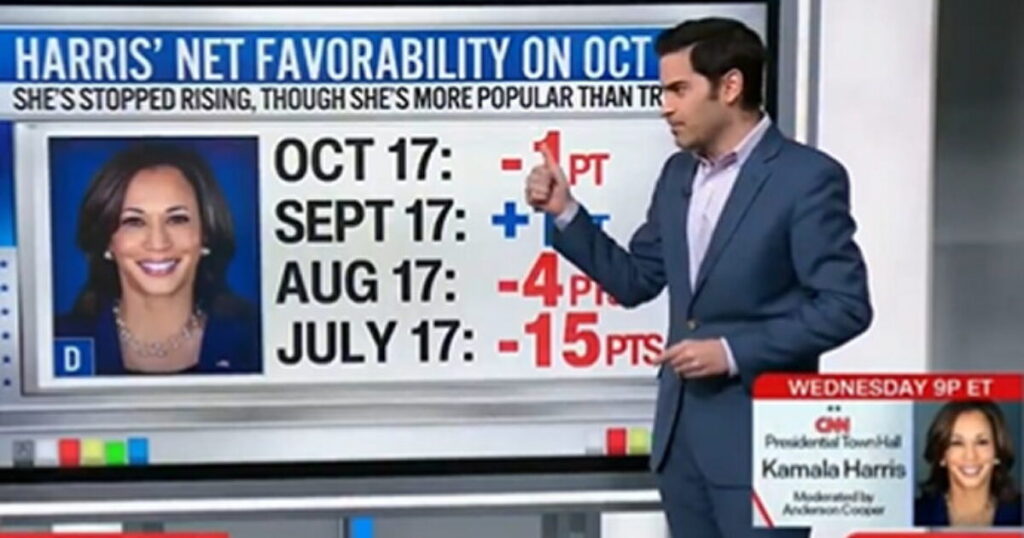CNN data analyst Harry Enten recently provided insights into the current political landscape surrounding Vice President Kamala Harris and former President Donald Trump. Enten observed that Trump’s favorability ratings have improved compared to his positions in both the 2016 and 2020 elections, suggesting that he is now enjoying a level of popularity that could potentially bolster his campaign efforts. In contrast, Harris has experienced a stagnation in her momentum, prompting her team to implement more aggressive strategies aimed at undermining Trump’s standing among voters. This shift in approach is indicative of the competitive atmosphere leading up to the election, as both candidates strive to solidify their respective bases and sway undecided voters.
Enten emphasized that while Trump remains less popular than his opponents on the broader scale, his current favorability numbers are strikingly better than at comparable points in previous elections. This dynamic presents a challenge for Harris, who, despite being more favorable than Trump, has seen her own popularity dwindle recently. The CNN analyst noted, “The momentum of Kamala Harris has stalled,” indicating that the initial rise in her appeal has not only plateaued but has also slipped slightly into the realm of negative favorability, a concerning trend for her campaign. This situation leaves her campaign in a precarious position, compelling her to initiate more direct attacks against Trump.
The media landscape has witnessed both candidates increasingly engage with the public through various platforms, such as podcasts and town hall meetings. This greater visibility is crucial in this highly contested election cycle, but for Harris, the need to pivot towards a more aggressive stance against Trump stems from a tactical necessity. With her approval ratings unable to sustain their upward trend, Harris’s campaign is banking on the strategy of taking aim at Trump, in an effort to reshape public perception and reclaim lost ground. For many political analysts, this shift underscores the urgency within her campaign to find new avenues to connect with voters and diminish Trump’s appeal.
Enten pointed out an important historical context: the reality that higher popularity does not guarantee electoral success, as demonstrated by former candidates like Hillary Clinton and Joe Biden, who were both more popular than Trump during their respective campaigns but ultimately faced challenges at the polls. He highlighted that simply being more favorable than Trump is insufficient for Harris to secure a victory. This observation indicates a fundamental shift in the political paradigm, where campaign dynamics are not solely dictated by approval ratings, but also by strategies that resonate with the electorate’s sentiments.
The increase in Harris’s aggressive rhetoric against Trump suggests a recognition from her campaign that traditional campaign strategies are not yielding the desired results. By aiming criticisms at Trump, Harris’s team appears to be hoping to galvanize support by diminishing his standing among voters who may be wavering in their allegiance or indecisive about their choices. Yet, Enten indicates that this approach is somewhat of a last resort since they seem to be out of options to reinvigorate the campaign’s initial momentum, making the situation a poignant commentary on the challenges faced by her team.
In conclusion, the evolving dynamics of the 2024 presidential race highlight a critical moment for Vice President Kamala Harris as she navigates a difficult political landscape. With Trump’s favorability numbers presenting a formidable challenge, Harris’s campaign has found itself at a crossroads, grappling with stalled momentum and the need for renewed strategies. By increasing attacks on Trump, the campaign is seeking to reclaim its footing amid the pressures of a closely contested race. Ultimately, this scenario not only reflects the struggles within Harris’s campaign but also the complex nature of voter engagement in modern politics, where popularity alone may not be enough to secure electoral success.

